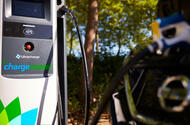BP buys EV charge company Chargemaster
 Buyout puts Chargemaster’s 6500-strong UK network of chargers under BP control and brings chargers to BP stations
Buyout puts Chargemaster’s 6500-strong UK network of chargers under BP control and brings chargers to BP stations
BP has agreed to buy EV charging company Chargemaster, bringing the 6500 EV charger network under its control.
Chargemaster will change its name to BP Chargemaster and BP will begin installation of Chargemaster points across some of its 1200 forecourts within the next year.
BP has also announced that BP Chargemaster will install the first 150kW fast chargers — that's 30kW up on Tesla’s current Supercharger system, but 150kW less than the second-generation Supercharger's mooted output and 200kW down on the Europe-wide charge network of Ionity, a collaboration between rival Shell, BMW, Daimler, Ford and the Volkswagen Group. Pod Point is currently also working on 150kW chargers for its public network, with the first examples being rolled out imminently.
Chargemaster boss David Martell said the takeover would allow Chargemaster to grow, supported by BP’s resources: “I am truly excited to lead the Chargemaster team into a new era backed by the strength and scale of BP, which will help us maintain our market-leading position and grow the national Polar charging network to support the large range of exciting new electric vehicles that are coming to market in the next couple of years.”
BP predicts that the number of EVs on UK roads will increase 89-fold by the time the Government’s ban on non-hybrid petrol and diesel vehicles comes into force in 2040, with 12 million estimated to be registered between now and that date, compared with 135,000 registered in 2017.
Tufan Erginbilgic, BP’s product and service chief, said: “Combining BP’s and Chargemaster’s complementary expertise, experience and assets is an important step towards offering fast and ultra-fast charging at BP sites across the UK and to BP becoming the leading provider of energy to low-carbon vehicles, on the road or at home.”
Chargemaster runs the Polar charge scheme, which has 40,000 members in the UK.
Erik Fairbairn, founder of Chargemaster rival and EV charger supplier Pod Point, said: "The acquisition of Chargemaster by BP is testament to the fact that the future of transport is electric. Traditional oil companies know that they cannot afford to ignore this shift from internal combustion engine vehicles. At Pod Point, we've always highlighted how EV technology is advancing so rapidly that, within just a few years, they will become the natural choice for anyone buying a car. Today's news shows that this is becoming an increasingly mainstream view. It’s obviously exciting to see the rapid acceleration of the EV market.”
Separately, James Court, head of policy and external affairs at the Renewable Energy Association, has criticised the Government’s comparative effort in building a charger network, 10 years on from the Climate Change Act of 2008: “Building a viable charging network is crucial to encouraging EV uptake and, in turn, to achieving our industrial strategy goals of being a global leader in battery manufacturing. This means upgrading wiring in new homes, giving tenants greater power to install charge points and expediting the process of developing charging hubs along the motorway.”
Shell has been active in EV charging infrastructure, with chargers being rolled out in selected areas, in addition to its involvement in Ionity. The UK Government also prompted progress last year by making charging points mandatory at all large petrol stations and motorway services under the Automated and Electric Vehicles bill. The move would increase the UK’s charge network considerably from the 11,500 charge points at the time.
Read more:
Jaguar I-Pace 45min rapid charge time ‘not yet possible in Britain'
BMW, Daimler, Ford and VW Group officially announce Ionity European EV charger network
Shell Recharge electric car service launches first in UK forecourts
Government to make EV chargers mandatory at large petrol stations and motorway services
Comments
Post a Comment